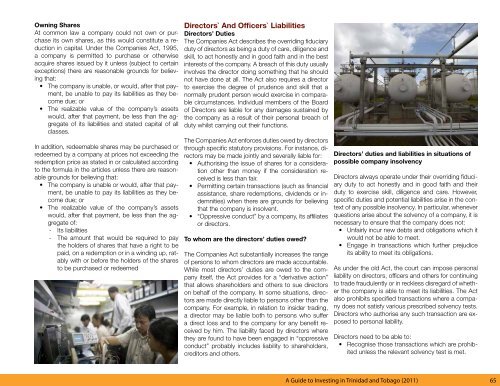A Guide to Investing in Trinidad and Tobago (2011) - Ministry of ...
A Guide to Investing in Trinidad and Tobago (2011) - Ministry of ...
A Guide to Investing in Trinidad and Tobago (2011) - Ministry of ...
You also want an ePaper? Increase the reach of your titles
YUMPU automatically turns print PDFs into web optimized ePapers that Google loves.
Own<strong>in</strong>g Shares<br />
At common law a company could not own or purchase<br />
its own shares, as this would constitute a reduction<br />
<strong>in</strong> capital. Under the Companies Act, 1995,<br />
a company is permitted <strong>to</strong> purchase or otherwise<br />
acquire shares issued by it unless (subject <strong>to</strong> certa<strong>in</strong><br />
exceptions) there are reasonable grounds for believ<strong>in</strong>g<br />
that:<br />
• The company is unable, or would, after that payment,<br />
be unable <strong>to</strong> pay its liabilities as they become<br />
due; or<br />
• The realizable value <strong>of</strong> the company’s assets<br />
would, after that payment, be less than the aggregate<br />
<strong>of</strong> its liabilities <strong>and</strong> stated capital <strong>of</strong> all<br />
classes.<br />
In addition, redeemable shares may be purchased or<br />
redeemed by a company at prices not exceed<strong>in</strong>g the<br />
redemption price as stated <strong>in</strong> or calculated accord<strong>in</strong>g<br />
<strong>to</strong> the formula <strong>in</strong> the articles unless there are reasonable<br />
grounds for believ<strong>in</strong>g that:<br />
• The company is unable or would, after that payment,<br />
be unable <strong>to</strong> pay its liabilities as they become<br />
due; or<br />
• The realizable value <strong>of</strong> the company’s assets<br />
would, after that payment, be less than the aggregate<br />
<strong>of</strong>:<br />
- Its liabilities<br />
- The amount that would be required <strong>to</strong> pay<br />
the holders <strong>of</strong> shares that have a right <strong>to</strong> be<br />
paid, on a redemption or <strong>in</strong> a w<strong>in</strong>d<strong>in</strong>g up, ratably<br />
with or before the holders <strong>of</strong> the shares<br />
<strong>to</strong> be purchased or redeemed<br />
Direc<strong>to</strong>rs` And Officers` Liabilities<br />
Direc<strong>to</strong>rs’ Duties<br />
The Companies Act describes the overrid<strong>in</strong>g fiduciary<br />
duty <strong>of</strong> direc<strong>to</strong>rs as be<strong>in</strong>g a duty <strong>of</strong> care, diligence <strong>and</strong><br />
skill, <strong>to</strong> act honestly <strong>and</strong> <strong>in</strong> good faith <strong>and</strong> <strong>in</strong> the best<br />
<strong>in</strong>terests <strong>of</strong> the company. A breach <strong>of</strong> this duty usually<br />
<strong>in</strong>volves the direc<strong>to</strong>r do<strong>in</strong>g someth<strong>in</strong>g that he should<br />
not have done at all. The Act also requires a direc<strong>to</strong>r<br />
<strong>to</strong> exercise the degree <strong>of</strong> prudence <strong>and</strong> skill that a<br />
normally prudent person would exercise <strong>in</strong> comparable<br />
circumstances. Individual members <strong>of</strong> the Board<br />
<strong>of</strong> Direc<strong>to</strong>rs are liable for any damages susta<strong>in</strong>ed by<br />
the company as a result <strong>of</strong> their personal breach <strong>of</strong><br />
duty whilst carry<strong>in</strong>g out their functions.<br />
The Companies Act enforces duties owed by direc<strong>to</strong>rs<br />
through specific statu<strong>to</strong>ry provisions. For <strong>in</strong>stance, direc<strong>to</strong>rs<br />
may be made jo<strong>in</strong>tly <strong>and</strong> severally liable for:<br />
• Authoris<strong>in</strong>g the issue <strong>of</strong> shares for a consideration<br />
other than money if the consideration received<br />
is less than fair.<br />
• Permitt<strong>in</strong>g certa<strong>in</strong> transactions (such as f<strong>in</strong>ancial<br />
assistance, share redemptions, dividends or <strong>in</strong>demnities)<br />
when there are grounds for believ<strong>in</strong>g<br />
that the company is <strong>in</strong>solvent.<br />
• “Oppressive conduct” by a company, its affiliates<br />
or direc<strong>to</strong>rs.<br />
To whom are the direc<strong>to</strong>rs’ duties owed?<br />
The Companies Act substantially <strong>in</strong>creases the range<br />
<strong>of</strong> persons <strong>to</strong> whom direc<strong>to</strong>rs are made accountable.<br />
While most direc<strong>to</strong>rs’ duties are owed <strong>to</strong> the company<br />
itself, the Act provides for a “derivative action”<br />
that allows shareholders <strong>and</strong> others <strong>to</strong> sue direc<strong>to</strong>rs<br />
on behalf <strong>of</strong> the company. In some situations, direc<strong>to</strong>rs<br />
are made directly liable <strong>to</strong> persons other than the<br />
company. For example, <strong>in</strong> relation <strong>to</strong> <strong>in</strong>sider trad<strong>in</strong>g,<br />
a direc<strong>to</strong>r may be liable both <strong>to</strong> persons who suffer<br />
a direct loss <strong>and</strong> <strong>to</strong> the company for any benefit received<br />
by him. The liability faced by direc<strong>to</strong>rs where<br />
they are found <strong>to</strong> have been engaged <strong>in</strong> “oppressive<br />
conduct” probably <strong>in</strong>cludes liability <strong>to</strong> shareholders,<br />
credi<strong>to</strong>rs <strong>and</strong> others.<br />
Direc<strong>to</strong>rs’ duties <strong>and</strong> liabilities <strong>in</strong> situations <strong>of</strong><br />
possible company <strong>in</strong>solvency<br />
Direc<strong>to</strong>rs always operate under their overrid<strong>in</strong>g fiduciary<br />
duty <strong>to</strong> act honestly <strong>and</strong> <strong>in</strong> good faith <strong>and</strong> their<br />
duty <strong>to</strong> exercise skill, diligence <strong>and</strong> care. However,<br />
specific duties <strong>and</strong> potential liabilities arise <strong>in</strong> the context<br />
<strong>of</strong> any possible <strong>in</strong>solvency. In particular, whenever<br />
questions arise about the solvency <strong>of</strong> a company, it is<br />
necessary <strong>to</strong> ensure that the company does not:<br />
• Unfairly <strong>in</strong>cur new debts <strong>and</strong> obligations which it<br />
would not be able <strong>to</strong> meet.<br />
• Engage <strong>in</strong> transactions which further prejudice<br />
its ability <strong>to</strong> meet its obligations.<br />
As under the old Act, the court can impose personal<br />
liability on direc<strong>to</strong>rs, <strong>of</strong>ficers <strong>and</strong> others for cont<strong>in</strong>u<strong>in</strong>g<br />
<strong>to</strong> trade fraudulently or <strong>in</strong> reckless disregard <strong>of</strong> whether<br />
the company is able <strong>to</strong> meet its liabilities. The Act<br />
also prohibits specified transactions where a company<br />
does not satisfy various prescribed solvency tests.<br />
Direc<strong>to</strong>rs who authorise any such transaction are exposed<br />
<strong>to</strong> personal liability.<br />
Direc<strong>to</strong>rs need <strong>to</strong> be able <strong>to</strong>:<br />
• Recognise those transactions which are prohibited<br />
unless the relevant solvency test is met.<br />
A <strong>Guide</strong> <strong>to</strong> <strong>Invest<strong>in</strong>g</strong> <strong>in</strong> Tr<strong>in</strong>idad <strong>and</strong> <strong>Tobago</strong> (<strong>2011</strong>) 65


